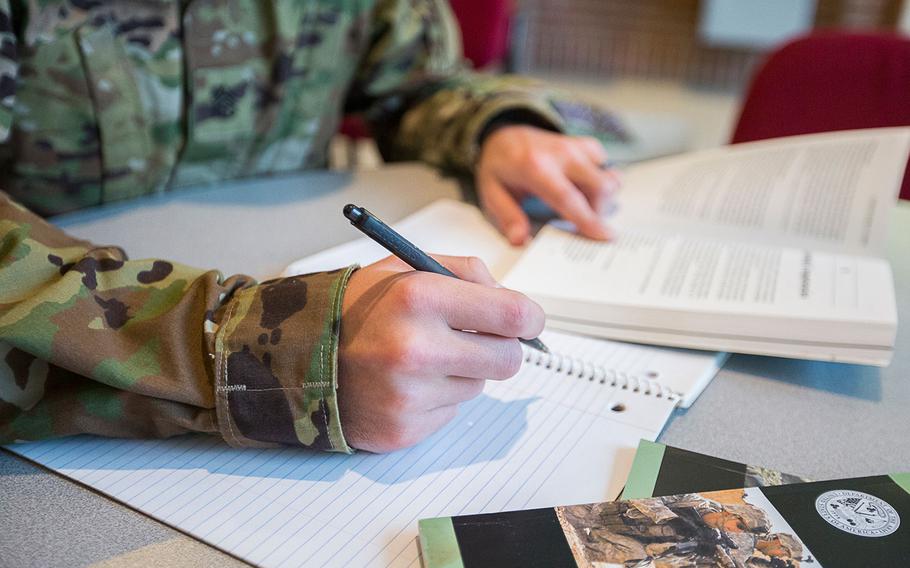
House lawmakers voted 405-0 unanimously passing a host of changes to veterans’ education benefits that aim to boost aid, expand who’s eligible for benefits and eliminate the expiration date for veterans to use them. (Joint Base Myer-Henderson Hall)
WASHINGTON — The House unanimously passed a large expansion of veterans education benefits last week, just nine days after the legislation was introduced in that chamber. But advocates are now concerned that momentum has been lost in the Senate.
Student Veterans of America, the American Legion and other groups have been pressing Senate leadership to schedule a vote on the expanded GI Bill for the past week.
“This is a broadly supported policy that should be taking center stage, and yet Senate leadership hasn’t made it a top priority to pass,” said Will Hubbard, vice president of government affairs for Student Veterans of America.
Senate Republicans decided to delay the chamber’s August recess two weeks, pointing to a backlog of nominations.
On Tuesday, Senate Majority Leader Mitch McConnell, R-Ky., said on the Senate floor that senators needed to use the work period before recess to confirm President Donald Trump’s pick for FBI director and other nominees, as well as pass an urgent funding bill for the nearly bankrupt Department of Veterans Affairs Choice Program.
But as of Tuesday morning, McConnell hadn’t announced a vote on the expanded GI Bill. Advocates with Student Veterans of America said they can’t get a clear answer on whether one will be scheduled before senators leave Washington for a recess.
Stephanie Penn, McConnell’s press secretary, responded to advocates’ concerns, saying, “Not scheduled is not the same as not on the radar.”
Student Veterans of America, which comprises chapters of student veterans at colleges nationwide, asked their 25 Kentucky chapters Monday to call McConnell’s office and request a vote before senators leave Washington for a recess.
The American Legion also sent an “action alert” to its members Tuesday, asking them to contact their senators immediately and request a vote this week.
“Thousands of veterans, survivors and their families have already waited too long to receive the education they’ve earned, and at this point, these issues are urgent,” Hubbard said. “This is a bipartisan bill that has no reason to be stalled. The Senate should take a cue from the House.”
Other advocates, including Got Your 6 and Veterans of Foreign Wars, have spread the message through social media to urge senators to vote on the bill. The conservative group Concerned Veterans for America also issued a statement Tuesday.
“The bill has passed the House unanimously and there is no reason to delay voting on it in the Senate,” CVA Policy Director Dan Caldwell said. “It is inexcusable for this measure to not pass before recess.”
VA Secretary David Shulkin also got behind the effort Tuesday. He tweeted: “I urge swift passage by the Senate before they leave on recess.”
By Tuesday morning, 60 of 100 senators, including McConnell, had signed onto the bill as co-sponsors.
The legislation boosts aid for dependents, Purple Heart recipients, technical education and members of the National Guard and Reserve. It restores benefits to veterans whose schools abruptly close and fixes a Pentagon deployment authorization that has kept about 5,000 reservists and guardsmen from accumulating education benefits.
It’s being dubbed the “Forever GI Bill” by advocates because it eliminates the 15-year limit for veterans to use their education benefits after leaving military service. That provision applies to veterans whose last discharge or release from active duty came on or before Jan. 1, 2013.
Altogether, it combines 18 bills and is expected to increase GI Bill costs by $3 billion in 10 years. To offset costs, the legislation calls for reducing the annual growth of GI Bill recipients’ living stipends to fall in line with active-duty servicemembers’ basic housing allowance. The decrease would not apply to people now using the GI Bill.